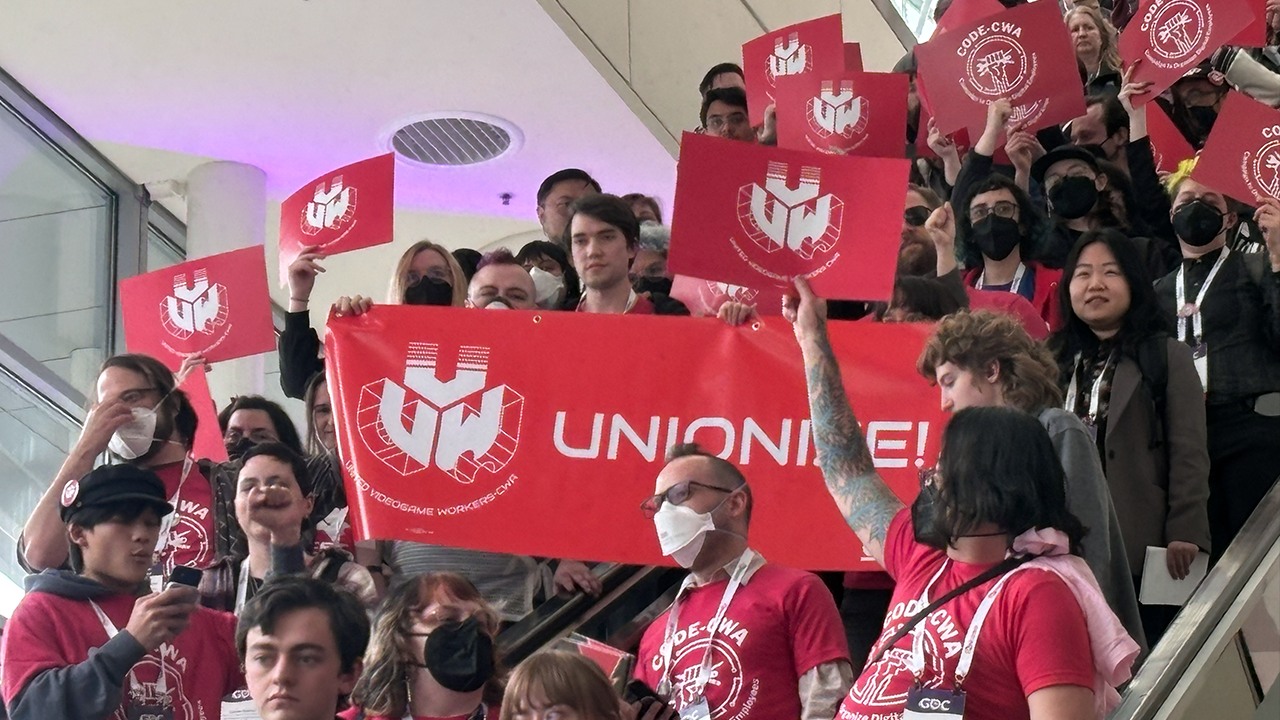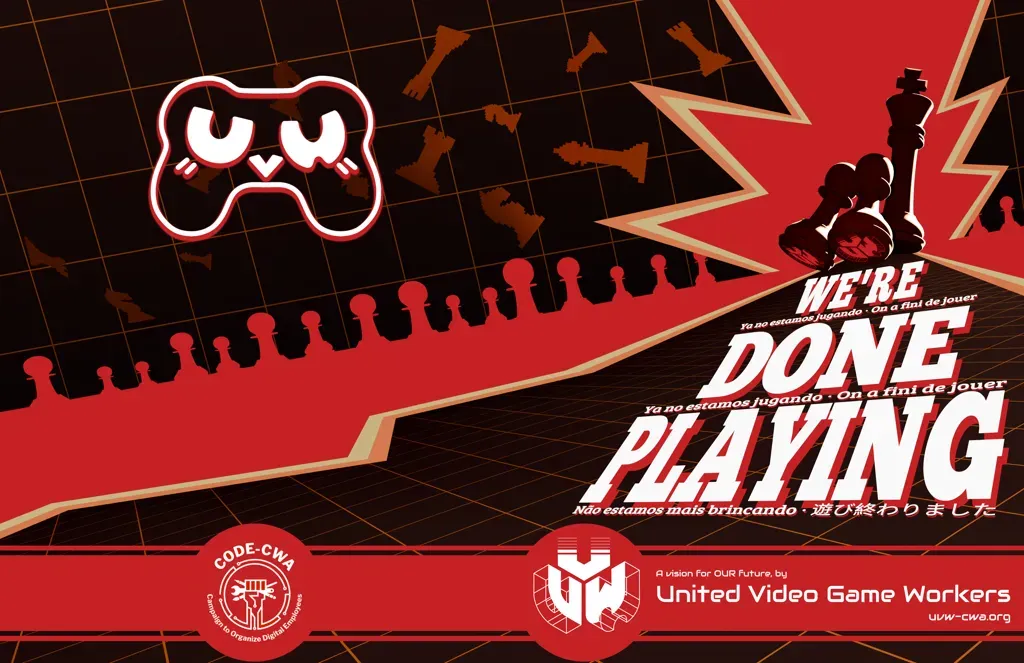“The way we fight back is by teaching workers to stand up for themselves and stand up for one another,” says union organizer and industry veteran, Witt Yao, during an somewhat impromptu roundtable interview on the final day of GDC 2025.
It was the last meeting I had during a hectic week that saw union workers make their voices heard by staging a rally that stretched from Moscone West to Yerba Buena Gardens and launching UVW-CWA, a new direct-join union that attracted over 300 new members in just a few days.
I had initially intended to interview a couple of CWA union members to hear why they feel collective action is absolutely fundamental if you’re someone who believes the game industry can—and, crucially, should—be better. In hindsight, it was absurd to think I could plant myself in the middle of the CWA booth for a modest chat.
My interview quickly morphed into a passionate roundtable with around seven workers, most of whom had simply clocked the fact I was here for a press interview and leapt at the chance to share their story. As more folks squeezed themselves around what I suspect might have been the smallest table in San Francisco, it became apparent just how ferociously passionate CWA union members feel about an industry that rarely seems to reciprocate that affection.
“We still have a lot of energy in us to help our industry be better than it is,” says Brian Ostrander, a software engineer and CODE-CWA member, when asked about the motivations behind launching UVW-CWA. “We’re excited about leveling up the organizing capacity at the conference over the last couple of days to get them on our level and get them fighting the boss as well.”
UVW organizing committee member, Kaitlin ‘KB’ Bonfiglio, explains unions are ultimately movements about “worker protagonism.” The appeal of UVW-CWA is that you simply pay your dues to receive your membership, but that’s merely the first step on a larger journey towards seizing control of your own fate.
“This is a moment by and for all of us,” says KB. “We’ve been answering a lot of questions such as ‘what do I get by joining?’ This movement is just beginning. If you think of IATSE and SAG-AFTRA—those unions have been around for hundreds of years. So if you think of this as the beginning of an industry-wide movement, you get to decide and vote on what we do and how our funds are used.”

CWA union members begin a rally in Moscone West at GDC 2025 / Image via Game Developer
Right now, UVW-CWA is focused on protecting workers from the encroachment of generative AI and the corporate sledgehammer of mass layoffs.
If you’re wondering just how prevalent the latter issue has become, one organizing committee member explains that, during their founding meeting, every single person in the room had either been impacted directly by layoffs or knew someone who had.
“The emotion [in that room] was so palpable,” they explain. “The sadness. The anger. The compassion. It’s very clear that’s the galvanizing issue. Everything else kind of flowed downstream from it.”
Those sat around me believe fighting back means convincing others that collective power can overwhelm even the largest corporation—who they feel have grown far too accustomed to exploiting a workforce that has accepted a false status quo.
“The real point of this movement is to engage people and to get them to understand that we have way more power than any corporation will ever have,” says Yao. “These are issues that are deeply rooted in human dignity and self respect, and we are told so often to put that all aside for your career. I believe that is a false dichotomy. You can have both and you should have both. We are trying to teach people that you deserve both.”
There’s a sense within the group that corporate leaders across the industry view video games as shimmering golden goose. That might go some way to explaining the growing disconnect between the developers pouring their hearts and souls into their work and those cutting their paychecks.
“The C-suite, at least in my experience, are not from the industry,” explains Ray, a unionized worker at Sega of America. “They don’t have a background in gaming. They often come from different industries, but they see the video game industry as this huge cash grab.”
It a sentiment that others around the table share. Ostrander notes how studios are frequently bought by private equity and “squeezed for all they’re worth”—but also feels there can sometimes be issues at smaller, indie studios, where some bosses might be laboring under the auteur delusion. He reiterates all workers—at every level—make valuable contributions when bringing a project to market. So why are some still struggling to get the recognition they deserve?
“We want those workers to feel empowered as well—and not to be pushed around by bosses who think they have better taste,” he adds.
Union members fear their passion and creativity is being ‘crushed and destroyed’
The fight for recognition and better conditions has also been hampered by union busting. When workers begin to organize, it’s not uncommon for employers to undermine their attempts by deploying a litany of well-worn tactics. I’m told the playbook often includes misclassifying people who should be full-time workers as contractors to limit their rights, jettisoning large groups of employees post-launch to halt any organization attempts in their tracks, or siloing remote workers to prevent them from communicating with their colleagues and presenting a united front. It can make the fight harder, but not impossible.
One member explains the CWA is now adept at spotting union-busting in action and is more then prepared to push back. The alternative to fighting—at least, for those sat around me—isn’t worth thinking about.
“We can see where [the game industry] is going to go [without unions],” explains Taylor Welling, OneBGS union member and organizer at Bethesda Game Studios. “Replacing employees with AI. Replacing employees with outsourcing. Treating employees poorly. It’s really heading towards an unpleasant working experience for workers.”
Yao agrees. “I’ve already seen where this is heading within the multiple workplaces, where all the passion and creativity that goes into these games is just being crushed and destroyed,” he explains. “We are experiencing burnout at an unprecedented rate—and the answer I keep hearing is ‘stop caring about what you do.’ We don’t get into this industry because we don’t care about video games. We absolutely care about this art form. So, to tell me the only way I can survive and have a career is to turn that side of my brain off and to stop caring about the art that I’m working on and the people I’m working with—that’s impossible.”

A digital version of the UVW-CWA informational zine handed out at GDC 2025 / Image via UVW-CWA
The passion and empathy is palpable. There is also steely resolve and iron-clad determination forged in the fires of an industry that appears to believe its talented workforce is disposable. An asset to be depleted and discarded without mercy. Can unions provide a quick fix? No. This skirmish has been raging for years. In what feels like a battle for the very soul of the industry, it seems they do offer something in abundance: hope.
“[I hope unions] can usher in a future where we don’t look around and wonder where all of our older mentors have gone. Where we don’t look around and wonder where all of the younger interns have gone, because it’s an industry that’s incompatible with having a family or taking care of a loved one when they’re in the hospital,” says Ostrander.
“[I hope it becomes] an industry that’s sustainable. One that reflects the people who play our games. Gaming is an incredibly diverse space. The appeal of games [is] wide and spans every walk of lives, and the people who reflect the games should reflect that diversity.”
Yao envisions future where people can expect a career that spans decades instead of “five years at the best.” The outpouring from those around me continues. How about a future full of worker cooperatives? Full of people who have benefits? The security of full-time roles? These are all concrete things unions are collectively driving towards. For those still on the fence, one member poses a very simple question: are you satisfied with where you’re at now?
“It’s not going to get better if you do not do something about it,” says KB.
Ostrander feels the recent onslaught of layoffs and studio closures has underscored the risk of simply doing nothing. So does Yao, who explains devs were told to “survive until ’25” only to arrive and realize the industry is still capitulating. “It’s no longer about surviving,” he says. “It’s about taking the reins and making the change ourselves.”
For Welling, there is now only one way forward. “Nobody with power is going to just turn around and become benevolent and start taking care of you in the way that you really need them to,” she adds. “The only way to get that is to use your own power and collectively work with other people to demand to be treated like humans.”



